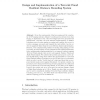Free Online Productivity Tools
i2Speak
i2Symbol
i2OCR
iTex2Img
iWeb2Print
iWeb2Shot
i2Type
iPdf2Split
iPdf2Merge
i2Bopomofo
i2Arabic
i2Style
i2Image
i2PDF
iLatex2Rtf
Sci2ools
123
click to vote
ESORICS
2012
Springer
2012
Springer
Design and Implementation of a Terrorist Fraud Resilient Distance Bounding System
Abstract. Given the requirements of fast processing and the complexity of RF ranging systems, distance bounding protocols have been challenging to implement so far; only few designs have been proposed and implemented. Currently, the most efficient implementation of distance bounding protocols uses analog processing and enables the prover to receive a message, process it and transmit the reply within 1 ns, two orders of magnitude faster than the most efficient digital implementation. However, even if implementing distance bounding using analog processing clearly provides tighter security guarantees than digital implementations, existing analog implementations do not support resilience against Terrorist Fraud attacks; they protect only against Distance Fraud and Mafia Fraud attacks. We address this problem and propose a new, hybrid digital-analog design that enables the implementation of Terrorist Fraud resilient distance bounding protocols. We introduce a novel attack, which we refer t...
| Added | 29 Sep 2012 |
| Updated | 29 Sep 2012 |
| Type | Journal |
| Year | 2012 |
| Where | ESORICS |
| Authors | Aanjhan Ranganathan, Nils Ole Tippenhauer, Boris Skoric, Dave Singelée, Srdjan Capkun |
Comments (0)

